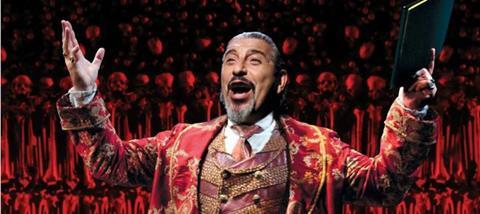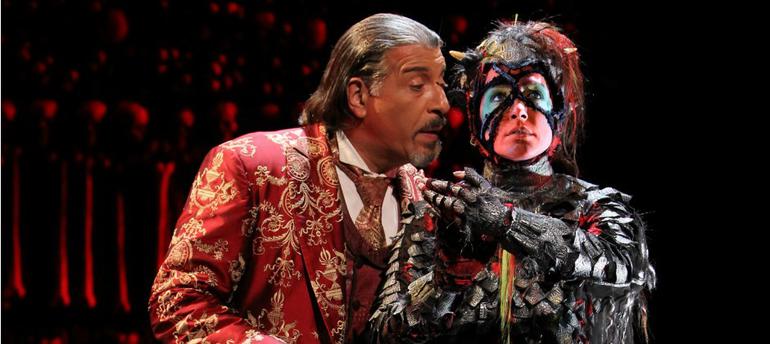
First published in 1942, The Screwtape Letters was the novel that propelled CS Lewis to international fame before he had even begun to compose the Narnia Chronicles, the children’s literature for which he is most well-known.
The genius of Lewis’ book, in which a senior devil Screwtape gives advice to his nephew Wormwood, a junior demon, on tempting a human ‘patient’ on earth, was the way in which morality was inverted. Good becomes bad and bad becomes good as Screwtape dispenses devilish guidance on how best to provoke the pride, gluttony and other vices of the human his underling has been assigned to.
Like the Narnia stories, Screwtape had an appeal beyond a specifically Christian audience, and various dramatic adaptions of the book by well-known actors such as John Cleese and Andy Serkis have proved that its themes have continued to speak to the wider public. In the decades since it was written avarice, pride and gluttony have never gone away, even if the methods for indulging them have changed.
Perhaps this is what convinced Max McLean, founder of Christian theatre company the Fellowship of Performing Arts, to bring his theatrical adaptation of Screwtape to UK shores this Christmas. Sticking closely to the text of the book, this 90 minute one act play is a dramatic monologue by McLean who plays the titular role. The only other character is his animated secretary-of-sorts Toadpipe, a role much expanded from the book to allow for some dramatic license on stage alongside McLean’s spoken words.
The Rolling Stones’ track ‘Sympathy for the Devil’ played as the audience congregated in the small venue of The Park Theatre, Finsbury where the play runs until 7th January. The intimate setting puts you in almost uncomfortably close proximity to Screwtape who inhabits an office in hell, furnished with a leather arm chair, footstool and an innovative mail chute for the receiving and sending of his correspondence. The bones of the damned provide a decorative backdrop, and there’s a suitably fiery red tinge of lighting to the proceedings.
Screwtape, a debonair figure in waistcoat and smoking jacket, dictates his letters to Toadpipe, played excellently by Karen Eleanor White. Looking more like your standard sort of demon complete with horns, she growls, grunts, leaps and writhes around the stage, occasionally acting out the earthbound episodes of the human subject.
With minimal staging and a cast of just two (only one of which speaks) the force of the play rests largely upon the broad shoulders of Max McLean who serves up a practically flawless monologue for fully ninety minutes. His delivery undulates from that of a laconic lounge lizard to enraged, spitting fury as the human subject slips between the fingers (or talons?) of his bumbling underling Wormwood.
As his frustration increases Screwtape becomes progressively more dishevelled. The cause of his anguish is that the human in question becomes a Christian, putting him within the camp of ‘The Enemy’ (God) rather than ‘Our father below’ (Satan, we assume). But there are still plenty of ways that a well-trained devil can misdirect and subvert a Christian’s walk, as the experienced tempter knows.
Anyone who has enjoyed reading Lewis’ book will enjoy this energetic stage adaptation. My only concern centred on whether, 75 years since it was written, the story still speaks to a non-Christian audience.
I don’t think the narrative device of the devil is a problem. Lewis never meant us to take his book as a theological explanation on the nature of the demonic world. Setting up Hell as an administrative bureaucracy with the protagonist occupying a position in middle management is meant to make us laugh, not look for doctrine. On that level, the play could be enjoyed by a non-Christian as much as a believer.
The real theological work of the book lies in the way that sin and temptation are described, not as grand sins of the flesh, but in the dull detail of everyday life. The small choices that contribute to the formation (or not) of Christian character are the stuff that occupies Screwtape’s missives. The back-to-front ethics offered by Screwtape still stands as a brilliant commentary on the nature of human pride, albeit located in the language and setting of the 1940s.
There are occasional nods to contemporary equivalents. The threat of air raids is replaced with ‘terror attacks’, and when Screwtape describes the numb distraction of staring at a dead fire in a cold room, he mimes flicking channels on a remote control. But the churchmanship of Wormwood’s convert is the prevailing high anglicanism of Lewis’ era, and the corresponding social references will sound anachronistic to most modern theatregoers, Christian or not. I personally would have appreciated more nods to the present, though in a short Q&A after the play, McLean seemed to indicate that the CS Lewis estate are unwilling to see the work too radically altered.
Nevertheless, this was a theatrical treat, worth the ticket price for McLean’s mephistophelian performance alone. Like anything written by CS Lewis, every well-crafted sentence repays close attention. I only hope that we will one day see Screwtape reincarnated to bring his inverted instruction into the 21st Century. The Screwtape Emails anyone?
The Screwtape Letters is at the Park Theatre, London until 7th January. Click here for more.
To receive a free sample copy of Premier Christianity magazine click here





























